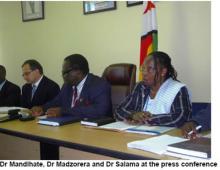$8.5 mil needed to fight measles
Harare, 29 March 2009 -- Zimbabwe needs around $8.5 mil to curb the on-going measles outbreak. This was said by the Honourable Minister of Health and Child Welfare, Dr Madzorera in a joint press conference with UNICEF and WHO. “Measles in Zimbabwe has reached crisis levels and urgent action needs to be taken to curb the epidemic,” said Dr Madzorera as he called on all political and community leaders to ensure their constituencies are involved in supporting and upholding the health of children. Zimbabwe is in the throes of a measles outbreak since September 2009, with 1884 suspected cases and 183 deaths from 45 of the 62 districts to date.
Zimbabwe, like other countries in the African region, introduced Supplementary Immunisation Activities (SIAs) that include Child Health Days, the Child Health Week strategy, the Reach Every District (RED) approach among others, to improve immunisation coverage thereby contributing to the reduction in deaths due to measles and other vaccine preventable diseases. The success of this program in reaching all children had virtually eliminated such vaccine preventable diseases as measles, polio and neonatal tetanus. However, declining routine immunisation coverages experienced recently, attributed in part to socio-economic challenges that resulted in the migration of health workers, lack of fuel & vehicles and challenges in carrying out outreaches, and a breakdown of the cold chain infrastructures, among other factors, contributed to the accumulation of a measles susceptible population. Another contributing factor is the open rejection of health interventions by certain apostolic sects of the Johane Marange and Masowe communities.
Speaking at the press conference, the WHO Representative Dr Custodia Mandlhate lamented the fact that children are dying from a disease that is both preventable and targeted for elimination. “It’s a terrible thing that children are dying from a vaccine preventable disease in 2010, for which there is treatment, and which was already in the elimination phase”, said Dr Mandlhate, illustrating clearly the effects of a broken down health system. The UNICEF Representative Dr Peter Salama also echoed the same sentiments when he called for the response to the epidemic to be in 2 phases, namely the emergency response to curb the current epidemic and the medium to long term response which seeks to strengthen the whole health system to guard against future outbreaks.
With support form WHO and UNICEF, the Ministry of Health and Child Welfare carried out an assessment, that informed the new National Measles Strategy to effectively contain the measles outbreaks and strengthen the routine program of immunization. The implementation of this strategy has necessitated the procurement of more vaccines and injection safety equipment to conduct a full mass immunization campaign in all 62 districts. It is against this background that an appeal for more resources amounting to $8.5 mil was made by the Honourable Minister of Health and Child Welfare. “We call upon all health partners to support the strategy technically and financially both in this campaign as well as in strengthening the national program of immunization,” said Dr Madzorera.
For more information contact:
Wendy Julias
Communications Officer
E-mail: juliasw [at] zw.afro.who.int
Tel.: +263 4 253 724/30



